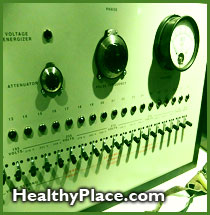A report submitted to the Department of Community Health Recipient Rights Advisory Committee on June 14, 2001, by committee member Ben Hansen.
 Michigan's Mental Health Code prohibits the administration of involuntary electroconvulsive therapy (ECT, electroshock) to an adult who has no guardian. Section 717 (1) (a) of the Code states, "A recipient shall not be the subject of electroconvulsive therapy or a procedure intended to produce convulsions or coma unless consent is obtained from ... the recipient, if he or she is 15 years of age or older and does not have a guardian for medical purposes."
Michigan's Mental Health Code prohibits the administration of involuntary electroconvulsive therapy (ECT, electroshock) to an adult who has no guardian. Section 717 (1) (a) of the Code states, "A recipient shall not be the subject of electroconvulsive therapy or a procedure intended to produce convulsions or coma unless consent is obtained from ... the recipient, if he or she is 15 years of age or older and does not have a guardian for medical purposes."
Unfortunately, this section of the Code is ignored by probate judges who sign court orders authorizing involuntary ECT in direct violation of Michigan law.
In October 1, a petition was filed in Lenawee County Probate Court by Dr. Daniel F. Maixner, who wished to administer ECT to a patient who had been involuntarily committed. The doctor's petition asserted "that the individual is a person suitable for electroconvulsive therapy pursuant to 330.1717."
Probate Judge John Kirkendall found "by clear and convincing evidence, the individual is a person requiring treatment because the individual has a mental illness, pursuant to order entered 10/6/99; it is advisable and reasonable to administer electroconvulsive therapy and diligent effort has been made to locate individuals eligible to give consent." The judge ordered "that the individual receive electroconvulsive therapy pursuant to the following schedule: maximum number of treatments: 12. Time within which such treatments shall be administered: over a 30 day period from the date of initial treatment."
An appeal was filed by Michigan Protection & Advocacy, and on May 31, 2000, 39th Judicial Circuit Court Judge Timothy Pickard issued an order which declared, "The statute is clear in identifying those individuals authorized to give consent. Competent adults, for whom a guardian has not been appointed, retain the right to make decisions about the administration of electroconvulsive therapy. It is apparent that Appellant is an individual for whom a guardian has not been appointed and that she is an adult. Under those circumstances, MCL 330.1717 does not authorize forced administration of electroconvulsive therapy. This Court therefore holds that the Order entered on October 12, 1999 be VACATED."
Two weeks after the circuit court decision cited above, a petition was filed in Calhoun County Probate Court by another psychiatrist who wished to administer ECT to a patient who had been involuntarily committed. Filling out a form entitled "PETITION AND ORDER FOR ECT TREATMENT," Dr. Ravinder K. Sharma asserted that "it appears that the individual is in need of a course of ETC. It further appears that the individual will not or cannot consent to such a course of treatment and that there is not a guardian to give such consent. I therefore request that the court permit that the individual undergo a course of ECT."
Probate Judge Phillip Harter granted the petition on June 16, 2000, ordering that "ECT may be performed upon the patient at Oaklawn Hospital, Marshall, Michigan. The number of treatments shall not exceed 12 and the last treatment shall be performed on or before 9/14/00."
Again Michigan Protection & Advocacy filed an appeal, this time in the 37th Judicial Circuit Court, and on October 23, 2000, Circuit Court Judge James Kingsley issued an order which echoed, almost word for word, the order which had been issued by 39th Circuit Court Judge Pickard five months earlier: "The statute is clear in identifying those individuals authorized to give consent. Competent adults, for whom a guardian has not been appointed, retain the right to make decisions about the administration of electroconvulsive therapy. It is apparent that Appellant is an individual for whom a guardian has not been appointed and that she is an adult. Under those circumstances, MCL 330.1717 does not authorize the forced administration of electroconvulsive therapy. This Court therefore holds that the Order entered on June 16, 2000, be VACATED."
The circuit courts have ruled with language that is unequivocal: Michigan's Mental Health Code prohibits the administration of involuntary electroshock to an adult who has no guardian. Unfortunately, some probate judges continue to ignore and/or defy the law.
Replying to an email query regarding court protocol as it pertains to ECT, Probate Judge Phillip Harter wrote the following in an email which he sent on May 14, 2001:
"There are generally two ways that ECT can be authorized without the consent of the patient. First, a guardian can be appointed for the patient and the guardian can give permission for the treatment. Second, a court can under the Mental Health Code find that the individual does not have the ability to consent and the treatment is necessary. Such a court could then give a hospital the authority to use ECT treatment for the patient."
When a follow-up email asked Judge Harter to clarify his interpretation of the law, the Judge wrote the following in an email which he sent on May 25, 2001:
"...in the context of a mental hearing, a judge may make a finding that the individual is not competent to give or withhold consent. This would be similar to a finding that the person meets the criteria for the appointment of a guardian. Once that finding is made, I believe the court can inquire as to whether or not ECT treatment is appropriate and order it if it is appropriate. The same thing would be accomplished by holding a guardianship hearing, appointing a guardian and authorizing the guardian to consent to ECT. I believe the better procedure is to have the guardian appointed for the purpose of consenting to ECT treatment."
Judge Harter seems to openly defy the circuit court rulings on involuntary ECT. Moreover, his remark that a guardian may be appointed "for the purpose of consenting to ECT" is most troubling, for it appears to be yet another example of how probate judges use guardianship as a way to circumvent competency standards, involuntary commitment procedures, involuntary treatment requirements and other laws designed to protect individual rights. This may be one reason why Michigan leads the nation in the number of adults who have been assigned legal guardians.
Consent laws are made a mockery by judges who rule that individuals are competent when they consent to treatment, but incompetent when they refuse treatment. The recipient rights system is a farce if the Mental Health Code is systematically violated and the Office of Recipient Rights takes no action in response.
On this question, ORR Director John Sanford wrote in an email which he sent on May 16, 2001:
"...Our mandate is to ensure that providers of mental health service maintain a rights system consistent with the standards established by the Mental Health Code. Administrative rule 7001(L) defines a provider as the department, each community mental health services program, each licensed hospital, each psychiatric unit and each psychiatric hospitalization program licensed under section 137 of the act, their employees, volunteers, and contractual agents. The courts are not considered a provider. Thus, ORR has no control or jurisdiction over them."
The fact that ORR has no jurisdiction over the courts is no justification for looking the other way when the Mental Health Code is violated. At the very least, ORR should provide rights officers and others with a correct interpretation of 330.1717, instead of contributing to the confusion by promoting contradictory and misleading information, as it did at "The 2000 Recipient Rights Conference" held at the Grand Traverse Resort in October of last year.
Conference participants received an information packet which included a document entitled, "A Mental Health Professional's Guide to Michigan Mental Health Procedure," authored by Probate Judge John Kirkendall. In a section on electroshock and the requirements for its use, the document states the following:
"The probate court may grant consent. This can occur if 1) No one can be found after diligent effort who meets the criteria above; 2) There is a petition and hearing. Once you believe ECT is indicated and you can find no one to give consent, you must cause a petition to be filed with the probate court. Call the prosecuting attorney in the county who handles these matters to take care of this for you."
The Office of Recipient Rights should make a concerted effort to inform all who attended last year's conference that the information quoted above is contrary to the Mental Health Code. Failure to do so will put ORR in the embarrassing position of appearing to endorse an interpretation of the Mental Health Code which has been ruled unlawful by the circuit courts.
*******
Attachments:
1. Michigan Mental Health Code, "330.1717 Electro-convulsive therapy; consent."
2. "Initial Order Following Hearing on Petition for Admission," Lenawee County Probate Court, File No. 99-438-M, October 12, 1999.
3. Order, 39th Judicial Circuit Court for Lenawee County, File No. 99-8390-AV, May 31, 2000.
4. "Petition and Order for ECT Treatment," Calhoun County Probate Court, (Probate Court No. 99-033MI) June 16, 2000.
5. Order, 37th Judicial Circuit Court, File No. 00-2429AV, October 23, 2000.
6. Email correspondence between Ben Hansen and Calhoun County Probate Judge Phillip Harter, May 22 - 31, 2001.
7. "A Mental Health Professional's Guide to Michigan Mental Health Procedure," Hon. John N. Kirkendall, Judge of Probate, Washtenaw County Probate Court, pages 1, 4 and 5.
next: Letter to Julie Butler
~ all Shocked! ECT articles
~ depression library articles
~ all articles on depression
 Statistics and facts about anxiety disorders; the most common mental illness in America.
Statistics and facts about anxiety disorders; the most common mental illness in America. The HB406, anti-shock, insulin shock and psychosurgery bill on kids under age 16 was interesting. NAMI stayed out of the picture and the NH Consumer Council came forward in favor of the bill. Three legislators testified in favor of the bill and none against it. Five shock psychiatrists and the Human Services Dept. came out against the bill. Without the NAMI buffer, it was clear that the patients didn't like the psychiatrists.
The HB406, anti-shock, insulin shock and psychosurgery bill on kids under age 16 was interesting. NAMI stayed out of the picture and the NH Consumer Council came forward in favor of the bill. Three legislators testified in favor of the bill and none against it. Five shock psychiatrists and the Human Services Dept. came out against the bill. Without the NAMI buffer, it was clear that the patients didn't like the psychiatrists.
 A list of what to do and what not to do to control anxiety.
A list of what to do and what not to do to control anxiety. Anxiety can cause serious relationship problems. Since it typically robs people of self- confidence and turns life into a struggle, people think they don't have much to offer in their relationships. Sometimes they spend so much time with the struggle they are not as involved in their relationships as they might want to be. Anxiety often causes feelings of shame, so people try to hide the anxiety and its effects from their partners. When that happens, their partners may think that they are withdrawing from them.
Anxiety can cause serious relationship problems. Since it typically robs people of self- confidence and turns life into a struggle, people think they don't have much to offer in their relationships. Sometimes they spend so much time with the struggle they are not as involved in their relationships as they might want to be. Anxiety often causes feelings of shame, so people try to hide the anxiety and its effects from their partners. When that happens, their partners may think that they are withdrawing from them. This matter was heard by Patricia L. Belois, one of the Judges of this Court, on September 12, 2002, pursuant to a Petition for Authorization to impose Treatment Electroconvulsive Therapy, filed herein on August 20, 2002.
This matter was heard by Patricia L. Belois, one of the Judges of this Court, on September 12, 2002, pursuant to a Petition for Authorization to impose Treatment Electroconvulsive Therapy, filed herein on August 20, 2002. Although better treatment and earlier rehabilitation programs help people recover swifter from a heart attack, adjusting to the psychological impact can take longer. Many survivors of a heart attack experience feelings of helplessness and depression.
Although better treatment and earlier rehabilitation programs help people recover swifter from a heart attack, adjusting to the psychological impact can take longer. Many survivors of a heart attack experience feelings of helplessness and depression. Michigan's Mental Health Code prohibits the administration of involuntary electroconvulsive therapy (ECT, electroshock) to an adult who has no guardian. Section 717 (1) (a) of the Code states, "A recipient shall not be the subject of electroconvulsive therapy or a procedure intended to produce convulsions or coma unless consent is obtained from ... the recipient, if he or she is 15 years of age or older and does not have a guardian for medical purposes."
Michigan's Mental Health Code prohibits the administration of involuntary electroconvulsive therapy (ECT, electroshock) to an adult who has no guardian. Section 717 (1) (a) of the Code states, "A recipient shall not be the subject of electroconvulsive therapy or a procedure intended to produce convulsions or coma unless consent is obtained from ... the recipient, if he or she is 15 years of age or older and does not have a guardian for medical purposes." The results of a new study suggest that a significant number of people with anxiety disorders, such as panic disorder or social phobia, have sexual problems as well. The study's authors report that these findings may have implications for therapeutic treatments involving medication.
The results of a new study suggest that a significant number of people with anxiety disorders, such as panic disorder or social phobia, have sexual problems as well. The study's authors report that these findings may have implications for therapeutic treatments involving medication. (Los Angeles, California): With the growing concern nationwide about violence, drug abuse, illiteracy, and other pressing social ills, people turn to their friends, their church, their doctors, school counselors and often, as a last resort, to the psychiatric industry for answers. But a new movement is rapidly developing. Similar to the popular trend to choose natural healing over orthodox medicine, people are doing the same for their mental health.
(Los Angeles, California): With the growing concern nationwide about violence, drug abuse, illiteracy, and other pressing social ills, people turn to their friends, their church, their doctors, school counselors and often, as a last resort, to the psychiatric industry for answers. But a new movement is rapidly developing. Similar to the popular trend to choose natural healing over orthodox medicine, people are doing the same for their mental health.